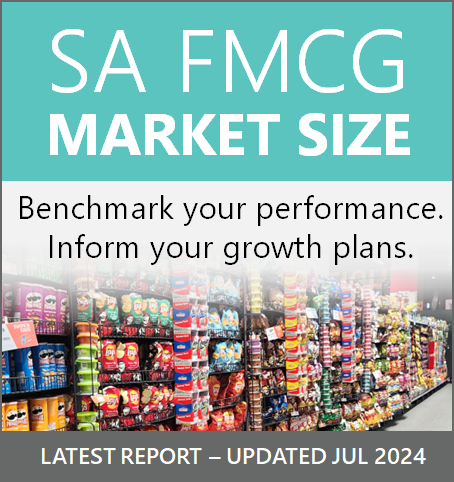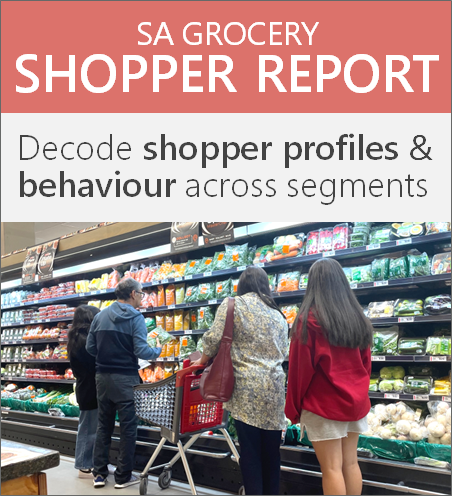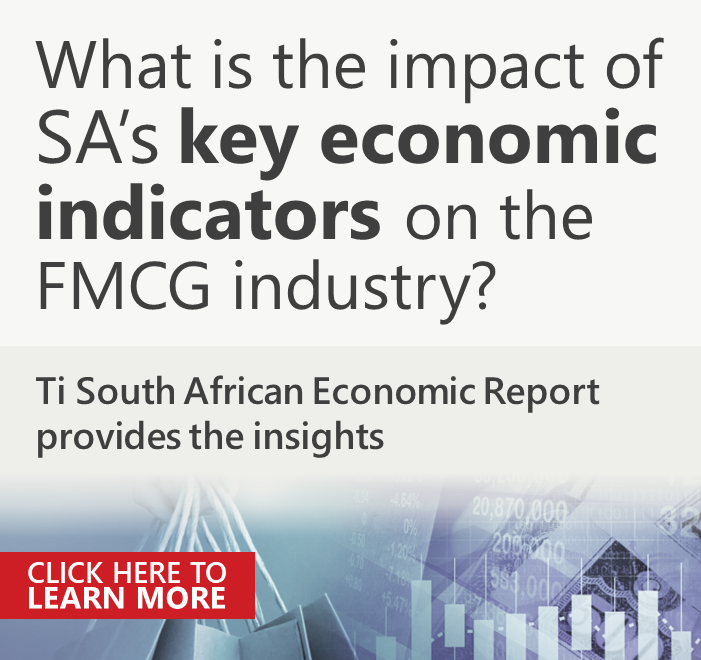
THIS ISSUE: 28 Jan - 03 Feb
Shakeups all over the show this week. Shoprite enter the brave new world of media, no doubt putting the wind up agencies everywhere. Pick n Pay will now flog you a licence disc for your motor, Walmart are taking to vertical farming, Ocado have invented about seven new types of robot, and the South African consumer has the long COVID. Enjoy the read.
YOUR NUMBERS THIS WEEK
RETAILERS AND WHOLESALERS
-
Shoprite Data way I like it (No. Ed)
In these days of little phones and big data, retailers have increasing volumes of the latter on which to base their business decisions and better serve their customers. And also, it turns out, to parlay into hard, hard cash. Witness this week the case of Shoprite, which recently launched Rainmaker Media, a specialised agency which helps suppliers target their audience online and in store, and optimise their ad spend with measured sales, accessing The Big Red One’s wealth of consumer data. “By working closely with brands, we will marry campaign objectives with the right audience and use previous campaign data to create the perfect omnichannel solution that delivers optimal and measurable results,” says the Group. One spinoff from the business, which was hatched in the ShopriteX incubator, is major savings in marketing costs and waste as Shoprite and its suppliers use Rainmaker Media as a precision advertising stream.
Comment: Good for the business, and doubtless others will follow. But it is to be hoped that there is room for existing media and advertising outfits in this new ecosystem.
-
-
Massmart Mass effect
So a Massmart update, then, for the year through December, telling the story of a year in which the Group’s solid turnaround strategy was largely frustrated by civil unrest in the middle of the year and ongoing fallout from the COVID-19 pandemic. Group sales fell -1.9% overall, although like-store sales were up by a razor-thin +1.7% GM plummeted by -9.7%, hit by the restriction on the global supply chain at the end of last year. Tellingly, sales at discontinued operations – the Cambridge and Rhino stores as well as Massfresh assets being bought by Shoprite – fell -10.6%. But the story of Makro is one from which the business might take heart: at 34% of Group sales, Makro grew turnover +6.6%, with liquor up +39.8% and even GM growing by +7.2%. Back to the downside: sales were down -8.1% at Game and -6.3% at the Wholesale Cash & Carry business. Builders grew +7.1%.
Comment: Essentially, a tale of two businesses – Builders and Makro vs the rest. It is to be hoped that the excellence that characterises the former may be brought through to the rest of the business.
-
-
In Brief Next up, Home Affairs. Please.
In another indictment of our creaking bureaucracy, or a testament to the efficiency of our private sector if you’d prefer, Pick n Pay last week launched a Vehicle Licence Disc Renewal Service nationally, enabling happy drivers to renew their licence discs in over 500 stores nationwide. And speaking of essential services, Woolies has digitised its ‘Making the Difference’ learning programme, which will now be accessible over desktops, phones and with supportive social media channels. Since inception ten years ago the programme has given over 3,000 schools access to educational content and learning experiences around nutrition, physical activity and sustainable living. Back to Shoprite now, and the Big Red One has entered into a partnership through its ‘Home Sweet Home’ campaign with the SA Canegrowers Association, which will see the business prioritising the sale of only locally produced sugar across its trading brands in the Beloved Country. Finally, Clicks has reported strong retail health and beauty sales of +14.4% for the 20 weeks through mid-Jan, driven in part by its role in the national vaccine rollout. The Group also reports gains in market share at both Clicks and UPD.
Comment: Licences, education, vaccines: we must accept that the privatisation of government services is a net benefit for the country and its people right now.
-
-
International Retailers Up on the farm
In further evidence of Lidl’s expansion in the UK, the German discounter has just opened a new 250,000sq ft head office in Tolworth, South London. The hub will support Lidl’s network of 900 stores, 13 warehouses and 26,000 staff across Brexitannia. Panels on its car park will provide 300kW of energy per hour, nothing short of a miracle in that sodden archipelago. Over the pond, Walmart has made a significant investment in Plenty, an indoor vertical farming business. The plan is to have both private label and Plenty-branded produce grown this way, in 280 stores by later this year. This in keeping with Walmart’s stated mission of bringing the farm closer to the store, which is something you can apparently do once you have acquired a certain scale. Back to the UK, and tech outfit-slash-retailer Ocado has developed a robotic picking arm which will reduce by an eventual 80% the need for human pickers to fill bags. It’s also building Orbit, a networked “virtual distribution centre” that will reduce the need for regional distribution centres.
Comment: We cannot tell you how excited we are by the prospect of vertical indoor farming. And more robots.
MANUFACTURERS AND SERVICE PROVIDERS
-
Nestlé Shaking the tree
Globally, chocolate makers are taking heat from investors, consumers and governments who wish to prevent them from sourcing cocoa beans produced using child labour or in illegal plantations in protected forests. Keen to produce a more ethical bar, Nestlé is offering cash incentives to farmers who send their kids to school rather than putting them out to work among the trees, as part of an initiative to source all of its cocoa directly and traceably by 2025. What’s more, Nestlé has said, it will triple its current annual spending on sustainable cocoa for a total of $1.4bn by 2030. To qualify for payment, farmers have to send their children to school, prune cocoa trees, plant shade trees and diversify their holdings with other crops or livestock. 51% of the cocoa Nestlé used in 2021 was directly sourced and traceable, versus 46% in 2020. The business will cover some of the additional costs through operational efficiencies.
Comment: An excellent initiative – costly, yes, but the right thing to do.
-
-
In Brief Cheers!
Congrats to Sharon Keith, new marketing director for Heineken South Africa, who will assume responsibility for a portfolio of brands that includes Heineken, Windhoek, Amstel, Strongbow and Soweto Gold. Keith has held senior marketing roles at The Coca-Cola Company, Diageo, Brandhouse Beverages, Unilever and Standard Bank. Further afield, Unilever is regrouping after its third failed attempt to buy GlaxoSmithKline’s healthcare arm, manufacturer of such bathroom cabinet staples as Advil and Sensodyne. Unilever CEO Alan Jope insists that the business remains committed to “accelerating the company’s growth and repositioning the portfolio into higher growth categories”; these categories, he believes, are health, beauty and hygiene. In the meantime, the business is shedding 1,500 jobs globally as it consolidates around five business groups: beauty & wellbeing, personal care, home care, nutrition, and ice cream.
Comment: It’s been a bit of a rolling shakeup at Unilever these past few years as the business rationalises its expansive portfolio of brands.
TRADE ENVIRONMENT
-
Consumers Hold… hooooold…
What’s up with the South African consumer you ask? We’re here to tell you. According to the NielsenIQ 2022 South African Consumer Outlook Study, they remain rattled by the rollercoaster that is COVID-19 and believe its effects will be with us until 2023. 41% of South Africans surveyed (versus the global average of 47%) said they would live with caution if COVID-19 to continues to impact the Beloved Country this year, while only 14% said they would continue to live their lives without fear. Shopping-wise, 70% of them say their weekly shop costs them more than it did six months ago, something they are dealing with by monitoring the cost of their overall basket spend, and by selecting the lowest-priced product regardless of brand (read more about this in our retail trends piece here). 82% of South Africans report that planning for the future will be more important to them over the next 12 months.
Comment: We’re dealing with a very different punter than we were two years ago – older, wiser, and less brand-driven, for starters (which we will cover, among other things, in our updated Retail Trends report out soon). Best we trim our sails accordingly.
Sign up to receive the latest SA and international FMCG news weekly.
Tatler Archive
“One of the biggest mistakes we made was trying to automate things that are super easy for a person to do, but super hard for a robot to do.”







1.png)
